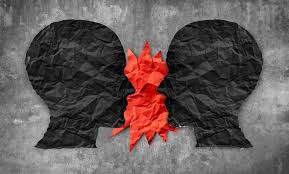
Being Medics in the Culture Wars
Besides the shock of the brutality of the invasion of Ukraine is the shocking revelation of what life in Russia has become.
Truth is whatever the dictator says it is. According to news reports, using the term “invasion” or “war” in respect to Ukraine can get Russians 15 years in prison. Protesters are brutally arrested and imprisoned. Atrocities committed by the Russian army in Ukraine simply didn’t happen, says the Russian government.
I wrote at the beginning that all this is a revelation. Maybe those who know more about Russia aren’t surprised. I am. I thought the era of Stalin was over.
It’s no surprise, however, that in such an environment, truth is the first victim. And that leads me to the subject of the deep division in our society, and from what I have learned, in many societies around the world.
Sadly, the culture wars are similar to the “real thing.” Truth becomes irrelevant as people stubbornly push and defend their positions. In my opinion, people searching for God should not allow themselves to get caught up in the bitterness.
The First Thing We Ask?
If the first thing we ask ourselves about people is whether they’re Democrat or Republican, liberal or conservative, we’re already leaning toward rigidity, at risk of allowing no place for the others’ views, for love of the other and the work of the Holy Spirit. Truth may start to take a back seat to ideology, making it easier to exaggerate and even lie to promote our cause.
Sometimes our ideology is embodied in a single person, as it has been in the U.S. and currently is in Russia. And it happens in religion as well as in political life.
The words of the Apostle Paul come to mind when he scolds the Christians of Corinth in his first letter to them. After saying he’s heard reports of their quarreling, he writes:
“What I mean is that each one of you says, ‘I belong to Paul,’ or ‘I belong to Apollos,’ or ‘I belong to Cephas,’ or ‘I belong to Christ.’ Is Christ divided? Was Paul crucified for you? Or were you baptized in the name of Paul?”
His point, of course, is that Christians are called to follow Christ, who focused his teaching on love of God and others, not on hatefulness and divisiveness.
That’s not to say that people searching for God won’t see the world in different ways and have disagreements about them. We still need to follow our consciences in voting and other aspects of public life, always leaning toward the common good and compassion. We can be passionate about our views without being combative.
And that brings us back to the culture wars. I was brought up in what was known as “the Church militant” and urged to be “a soldier of Christ.” It was a time when Catholics, many of them immigrants, were on the defensive in a sometimes-unfriendly society. Since then, we’ve awakened to Gospel values.
Said Pope Frances in a 2013 interview, reported in America Magazine:
Heal the Wounds
“I see clearly that the thing the church needs most today is the ability to heal wounds and to warm the hearts of the faithful; it needs nearness, proximity.
“I see the church as a field hospital after battle. It is useless to ask a seriously injured person if he has high cholesterol and about the level of his blood sugars! You have to heal his wounds. Then we can talk about everything else.”
In other words, for people searching for God – Democrats and Republicans, liberals and conservatives – doctrine and ideology are secondary to love of God and others. And love of others may require a suspension of, or even departure from, our ideology.
If people searching for God must be in the culture wars, it should be as medics, not soldiers.



